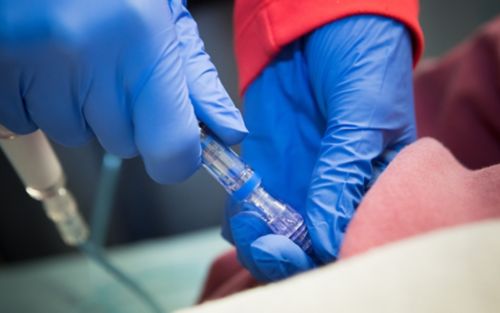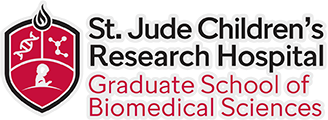
A Unique Training Environment
The Master’s in Clinical Investigations program provides students with a unique educational opportunity to advance their understanding of the development, implementation, conduct and oversight of clinical investigation under the mentorship of St. Jude clinical investigators.
The Clinical Investigations program equips students with knowledge, tools and skills to enable them to:
- assemble and assimilate scientific evidence
- understand the principles of developing and conducting clinical trials
- apply analytical tools to interpret the findings
- report findings to the broader medical community
- acquire leadership and management skills to implement findings that improve human health
Core Competencies
In addition to articulated Student Learning Outcomes the Clinical Investigations program has developed Core Competencies.
Students will be trained in multiple core competency domains, which are modeled on those developed by the American College of Epidemiology and the Association of Schools of Public Health and will serve as the core of the program. Each student is also required to demonstrate mastery of applicable core competencies through an original research project related to a specific topic as part of their training (Thesis Research Project).
| Domain | Competency |
|---|---|
| Descriptive epidemiology | Produce the descriptive epidemiology of a given condition, including case definition, calculation of primary measures of disease morbidity/mortality, and appropriate comparisons by person, place and time |
| Identify data from existing national and international sources | |
| Identify major chronic and infectious diseases, their general pathophysiology, descriptive epidemiology, and risk factors | |
| Know the principles of screening and of surveillance systems, including understanding the concepts of validity and reliability of screening tests; be able to calculate associated measures and know the types of surveillance systems and approaches used in disease surveillance | |
| Problem Conceptualization | Search the scientific and biomedical literature |
| Review and critically evaluate the literature | |
| Synthesize available information and identify meaningful gaps in knowledge | |
| Formulate an original and key hypothesis or statement of the research problem | |
| Study Design | Design a study using any of the main study designs (including clinical trials and community trials) |
| Understand the advantages and limitations of each design for addressing specific problems, as well as the practical aspects of their uses, including trade-offs; this understanding will be reflected in selecting the most appropriate and efficient design for a designated problem | |
| Calculate the requisite sample size | |
| Identify and minimize sources of bias; describe both the direction and magnitude of the bias and the effect of potential biases on the measures of association | |
| Use basic population sampling methods | |
| Data Collection and Monitoring | Use appropriate methods of measurement; design data-collection forms assessing both exposures and outcomes; determine the validity of the instrument; identify the presence and magnitude of measurement error; adjust for measurement error when appropriate data are available |
| Monitor the conduct and progress of data collection; develop, implement and assess quality control measures | |
| Data Management | Create data files appropriate for analysis; carry out the steps needed to create new variables, clean the data sets, and maintain the data |
| Data Analysis | Use statistical computer packages to calculate and display descriptive statistics, analyze categorical data, and perform multivariable regression, survival analysis, and longitudinal analysis |
| Examine data for the presence of confounding and interaction (effect modification), identify their presence, and manage them appropriately | |
| Data Interpretation | Interpret the research results, make appropriate conclusions and inferences based on results, and recognize the implications of the research results |
| Communication | Communicate research results orally and in writing to both scientists and non-scientists (includes presenting research proposals and preparing a manuscript suitable for publication in a scientific journal) |
| Ethics | Understand the concepts of human subjects protections, privacy and confidentiality in research, and awareness of particular issues relevant to the study of specific populations |
| Apply this understanding as evidenced in the design and conduct of one’s own research | |
| Regulatory Oversight | Understand the current rules and regulations that define the conduct of clinical trials including Food and Drug Administration (FDA) and European Medicines Agency (EMA) requirements |
| Understand the rationale, content and process of Clinical Trials Agreements, Material Transfer Agreements and Data Transfer Agreements | |
| Substantive Area | Demonstrate mastery of a substantive area, including knowledge and application of that knowledge in conducting original research related to a specific topic |
Through the program, students build an understanding of the relationship between clinical trials and progress in improving human health. Students also gain necessary skills to not only develop and implement independent new clinical research but also to critically appraise the clinical research of others. It is envisaged that students will master new knowledge and skills, critically examine assumptions and beliefs, and engage in an invigorating, collaborative quest for learning and personal development.
Courses and Schedule
The core curriculum of the Clinical Investigations program comprises 11 courses over two years. The courses run from week to week through Fall and Spring semesters and are listed below. Trainees take most of their coursework the first year, allowing for focus on elective course work and independent research in the second year.
The Clinical Investigations curriculum follows a hybrid synchronous and asynchronous delivery model. Synchronous class sessions occur on Tuesday/Thursday afternoons via web conference. Attendance for synchronous sessions is mandatory. Additional self-paced course content is available to students online.
| Year 1 | |
|---|---|
| Fall Semester | Biostatistics for the Health Sciences I |
| Introduction to Epidemiology | |
| Introduction to Patient-Oriented Research | |
| Spring Semester | Biostatistics for the Health Sciences II |
| Advanced Clinical and Translational Research Methods | |
| Scientific Writing and Communications | |
| Year 2 | |
| Fall Semester | Ethical and Legal Issues in Clinical Research |
| Critical Assessment of Contemporary Clinical Trials | |
| Elective | |
| Thesis Research Project I | |
| Spring Semester | Thesis Research Project II |
Year 1: Foundations of Clinical Investigation
During this year, students participate in classroom instruction and readings that seek to establish an understanding of the process of clinical investigation. The semester requires attendance in class as well as outside readings and homework. Midterm and final examinations are also given.
Year 2: Focused Clinical Investigation Project
Year 2 of the program focuses on acquisition of in-depth knowledge of the student’s career pathway. Students choose an elective course specifically focused on an aspect of clinical investigation. Through this elective course, students gain insight on how to develop a career in their specialties and begin to develop the interpersonal connections critical to success. Options for the elective course are:
- Behavioral and Social Sciences
- Advanced Epidemiology
- Clinical Genomic Data Science
- Drug Development – from Bench to Bedside
- Translational Neuroscience
- Implementation Science
Another course that focuses on the ethical and legal issues in clinical research familiarizes students with guiding principles and regulations necessary for the conduct of ethical research. Critical Assessment of Contemporary Clinical Trials is a seminar class that reviews recently published clinical investigation to better understand the real-world applications of their classroom learning.
Students spend the majority of their time focused on developing and completing their thesis research project. To guide the student’s progress in this project, the program directors will identify a primary subject matter expert and ensure that progress is occurring.
Master's Thesis Research Project
The thesis research project is the culmination of studies and the primary locus for translation of the knowledge and skills students acquired through the program. Students write a clinical research project, including background, justification, process and measurable results that are expected to make significant contributions to positive change. Impact may be achieved through direct action to improve human health, development of a new intervention, or a better understanding about risk or causality.

